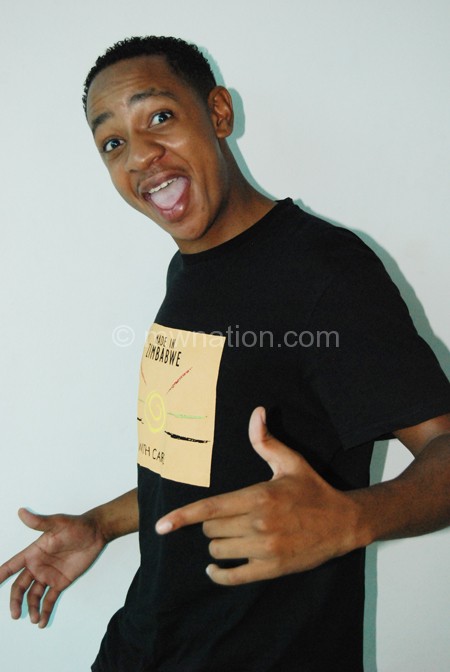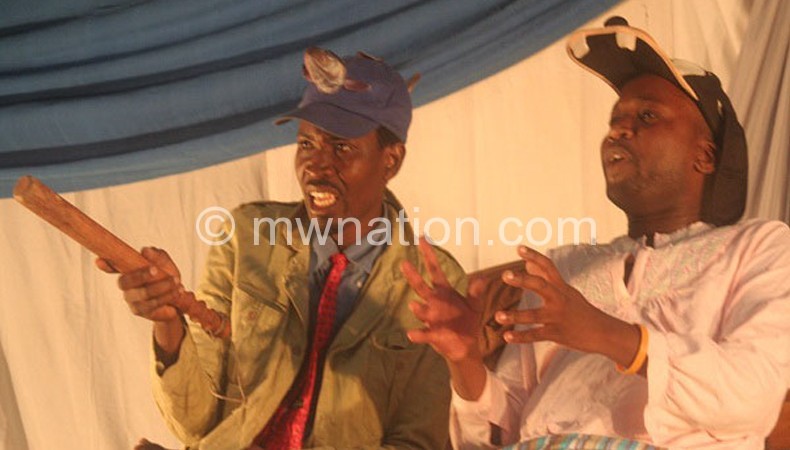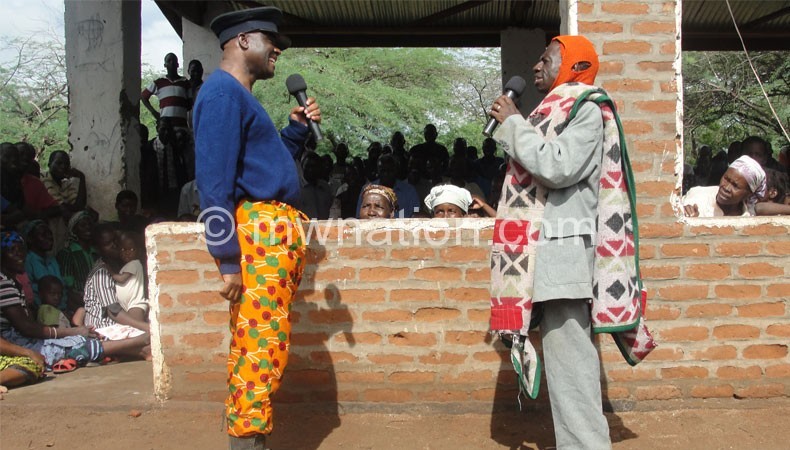Easter drama memories
The long Easter weekend seemed shorter for theatre enthusiast in Blantyre and Lilongwe as Solomonic Peacock Theatre Company dated Blantyre and Lilongwe in the inaugural Easter Theatre Festival at Blantyre Cultural Centre and Lilongwe Old Town Hall respectively.
The festival brought together acts from Malawi, Zambia and Zimbabwe. The menu cut through plays, stand-up comedy, dance and mimicry.

On the line up were drama groups Solomonic Peacocks and Kwathu; comedians Bikiloni and Difikoti from Zambia, Izeki ndi Jakobo from Malawi; stand-up comedians Clive Chigubu from Zimbabwe, Madalitso Nyambo and Mr Jokes from Malawi, several poets including Yankho Seunda, Robert Chiwamba, Evelyn Pangani-Maotcha, Sylvester Kalizang’oma and Joseph Madzedze and mimic artists Aunti Getu who imitates Joyce Banda, Atcheya who mimics Bakili Muluzi and Puludzu who imitates John Tembo.
Making a surprise appearance in Blantyre was Atsikana Paulendo with their play John 3 verse 16, a tale of a drunk who stabs his pregnant wife to death, only to realise she was his daughter, born of a woman he raped as he went about his duties as a fisi.
To add icing on the cake, the festival also featured Zimbabwe’s Icon and their mbira dance while Malawi brought on the Village Cultural Troupe and Floor Steppers.
The festival kick-started in Lilongwe with a denumerable-sized audience—too small for such a large venue.
In an interview with The Nation, Macarthur Matukuta, executive director of Solomonic Peacocks, organisers of the festival, said the Lilongwe show suffered a low turnout because there was change of venues at eleventh hour.
“We initially planned to perform at Madsoc Theatre, but due to financial constraints we failed to have it there so we had to look for a new venue. The only venue available was Lilongwe Old Town Hall,” he said.
Matukuta further attributed the low patronage to the dilapidated state of the venue which he said is not ideal for shows in its current state.
Even after they performed to climax the festival, Bikiloni, real name Levison Ngoma, acknowledged Blantyre was a better stage than Lilongwe.
“The Blantyre audience was not only huge, it was also highly responsive. All in all, the bringing together of cultures is worth praising,” said the comedian.
In Lilongwe, Zimbabwean comedian Clive Chigubu struggled through his set to deliver punch-lines in his routine dubbed The Clive Show as he did not make an impression on stage in his first minutes.

The comedian later confessed in an interview that the situation forced him to change his set, such that he had to throw in random jokes.
“As a stand-up comedian the first ten minutes are very important and it is very imperative that you read your audience. So when I discovered the audience was not responding to my set, I had to change it quickly. The moment I did that, they laughed all the way to the end. But I liked Blantyre, it seems the audience were easier with English comedy than Lilongwe. I don’t know the reason,” said Clive.
It is not that the jokes were not funny, but perhaps the audience was not used to English gags. His fluency in English, Shona, Ndebele as well as Zulu made his performance more hilarious to those knowledgeable about the languages as he would, unceremoniously, interchange the languages.
Clive’s set was full of energy both in Lilongwe and in Blantyre and he made it more relevant by raising situations that the audience could relate to. However, unlike in Lilongwe, where he threw random jokes, Clive had a set that had powerful punch-lines that sent the audience into stitches of laughter.
Izeki ndi Jakobo proved they remain the evergreen patriarchs of Malawian comedy. Once they were on the set, laughter engulfed the Blantyre Cultural Centre.
One thing for sure is that all the comedians performing shared a set of themes they tackled: politics, the economy (talk of stacks of Zimbabwe dollars heaped in wheelbarrows on the way to buy a loaf of bread!), religion and even gender.
Talking about gender, Bikiloni and Difikoti delivered one joke that left patrons nodding: vive la difference. It tells of a man who went to God with his wife for a sex change. When they return to earth, the ‘husband’ drives off to work, leaving the ‘wife’ at home. She is confronted with lots of household chores so much that when the ‘husband’ returns, she responds to his questions with impunity. The ‘wife’ suggests they go back to God the following morning and reverse the situation. When they do so, a surprise awaits them, as God tells the ‘wife’: “I could have changed you back to a man, but you are pregnant’.

Kwathu brought Yankho, a play that revolves around the love of a woman who turns to prostitution to educate her son after she divorces his father. The father remarries and abandons his son since his new wife would not allow him to have anything to do with his former family. The play reaches a climax when the son shoots to death his father’s new wife.
In spite of its well-woven plot and apt theme, the play had some gaps.
“It is because we were allocated only one hour. We had to compress the play so much to fit that time,” said Kwathu member Charles Mphoka, aka Magagula.
The allocation of time could also be felt in the poetry performances, where each poet was allocated only two poems. Literary enthusiast and chairman for the Blantyre Arts Festival (BAF) Alfred Msadala, hailed the festival but observed that poets in vernacular need to do more on their poetry.
“Some of them are not reciting poetry. You can note that some of these are just recycling old jokes that are already in the public domain,” said Msadala.
Among other surprises at the festival was Nicholas Mbonela with his Nancy skit. It was difficult to imagine Che Nkope and Nancy’s phone conversation on stage. But Mbonela ably brought in a set of actors on a queue at an ATM, where Che Nkope is disturbed from processing his transaction with the call from Nancy.
“I am rediscovering myself. I know there are some areas of improvement but being the first time, the future certainly has something to offer,” said the artist.
For those who watched Icon, the spirit of mbira was sprayed on them. The group combined mbira beats and dance moves to tell African stories. Musical drama came alive through their performance. Their repertoire included Nhemha Musasa (prepare shelter for yourself) and Chemutengure (things are not going well, let’s move on).
“We are happy with the reception we got. We play traditional music to tell our African stories. Music and dance know no borders and the arts unify,” said lead vocalist and mbira player Japhet Matamba.
Matukuta said they did not have enough money to bring out a show as spectacular as they had imagined because the corporate world did not help them, echoing the concern raised by Difikoti (real name Thomas Sipala).
“We did not have sponsorship, so we had a lot of difficulty to meet many costs. We are hoping that with this show, the companies are confident that we cn deliver and they will come forward next time,” said Matukuta.
He praised the performers saying they gave the best displays more than expected, saying the stage will be back next Easter.





